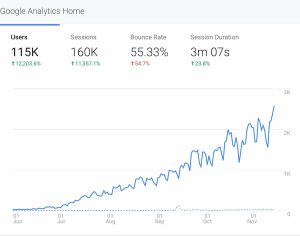Hi, Dave Fox here from Starscape SEO. A content marketing manager is a pivotal figure in modern businesses, responsible for developing and executing strategies to attract, engage, and convert target audiences through effective content creation and distribution.
This role requires a blend of creativity, analytical skills, and strategic thinking. Let’s dive into the key responsibilities of a content manager and what they entail.

Call or Text Starscape SEO: (519) 208-8680

Strategy Development
Alignment with Business Goals
A content marketing manager must ensure that the content strategy is directly aligned with the overall business objectives. This involves understanding the company’s mission, vision, and target audience.
Defining KPIs
Setting clear and measurable key performance indicators (KPIs) helps track the success of the content marketing efforts. These KPIs can include website traffic, leads generated, conversion rates, and social media engagement.
Content Creation

Diverse Content Formats
A successful content marketing strategy requires a variety of content formats to cater to different audience preferences and consumption habits. This may include blog posts, articles, videos, infographics, podcasts, and social media content.
Quality Assurance
Ensuring that content is high-quality, informative, and engaging is crucial. This involves editing, proofreading, and ensuring that the content adheres to brand guidelines.
Content Distribution
Channel Selection
Identifying the most effective channels to reach the target audience is essential. This may include social media platforms, email marketing, content syndication, and paid advertising.
Timing and Frequency
Understanding the optimal timing and frequency of content distribution is crucial for maximizing reach and engagement.
Analytics and Measurement

Data-Driven Decision Making
Tracking and analyzing key performance indicators (KPIs) allows content marketing managers to make data-driven decisions and optimize their strategies.
Identifying Trends
Monitoring trends in audience behavior and preferences helps identify opportunities for content creation and distribution.
Team Management
Leadership and Collaboration
Effectively leading and managing a team of content creators, editors, and designers is essential.
This involves setting clear expectations, providing guidance, and fostering a collaborative work environment.
SEO Optimization

Search Engine Visibility
Ensuring that content is optimized for search engines improves its visibility and organic traffic.
This involves incorporating relevant keywords, optimizing meta tags, and improving website structure.
Brand Consistency
Strong Brand Identity
Maintaining a consistent brand voice and messaging across all content platforms helps strengthen brand recognition and loyalty.
How Does A.I. Content Affect The Content Manager’s Role?

The advent of AI content generation has significantly transformed the role of a content marketing manager.
While AI can streamline certain tasks and automate content creation, it doesn’t eliminate the need for human oversight and strategic thinking.
Here’s how AI is impacting the content marketing manager role:
Content Generation
Speed and Efficiency
AI tools can generate content quickly, allowing content marketing managers to produce more content in less time.
Idea Generation
AI can help brainstorm new content ideas and provide different perspectives.
However, human oversight is still crucial to ensure the content is accurate, engaging, and aligned with brand guidelines.
Personalization

Targeted Content
AI can analyze audience data to create personalized content that resonates with specific individuals or segments.
Improved Engagement
Personalized content can lead to higher engagement rates and better conversion rates.
Data Analysis
Insights and Optimization
AI-powered analytics tools can provide deeper insights into content performance, allowing content marketing managers to make data-driven decisions and optimize their strategies.
Automation
Routine Tasks
AI can automate routine tasks like social media scheduling, email campaigns, and basic content formatting.
Freeing Up Time
This frees up content marketing managers to focus on more strategic and creative aspects of their role.
Why Content Managers Still Play A Crucial Role

Despite these advancements, AI cannot fully replace the human touch in content marketing. Content marketing managers still need to:
Strategy Development: Create a cohesive content strategy that aligns with business goals.
Creative Direction: Provide creative direction and ensure the content is engaging and relevant.
Quality Control: Review and edit AI-generated content to maintain quality and consistency.
Ethical Considerations: Ensure that AI-generated content is ethical and avoids biases.
Who Hires Content Marketing Managers?

Content marketing managers are in demand across a wide range of industries and company sizes. Here are some common employers:
Marketing Agencies
These agencies often hire content marketing managers to create and manage content for their clients.
Content Marketing Firms
Specialized firms that focus solely on content marketing often employ content marketing managers.
In-House Marketing Teams
Larger businesses frequently have dedicated marketing teams that include content marketing managers.
Startups and Small Businesses
Even smaller companies recognize the importance of content marketing and may hire a content marketing manager to handle their content strategy.
Non-Profit Organizations
Non-profits often use content marketing to raise awareness and generate donations.
Educational Institutions
Universities and schools may hire content marketing managers to promote their programs and attract students.
Salary Range

The salary for a content marketing manager can vary significantly depending on factors such as:
Experience
More experienced content marketing managers generally earn higher salaries.
Location
Salaries can differ based on the cost of living in different regions.
Company Size and Industry
Larger companies and industries with higher revenue often offer higher salaries.
Specific Skills and Responsibilities
Content marketing managers with specialized skills or additional responsibilities may earn more.
According to Salary.com, the average salary for a content marketing manager in the United States as of April 2024 is around $85,000 per year.
However, this can range from $60,000 to $120,000 or more, depending on the factors mentioned above.
Please note that salary information can vary over time and may differ in other countries or regions.
In Conclusion

A content marketing manager plays a multifaceted role in driving business success.
By effectively developing and executing content strategies, they can attract, engage, and convert target audiences, ultimately contributing to the achievement of business goals.

